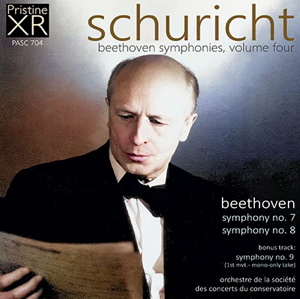
Ludwig van Beethoven (1770-1827)
Symphony No. 7 in A major, Opus 92 (1811-12)
Symphony No. 8 in F major, Opus 93 (1812)
Symphony No. 9, Opus 125 – first movement (1824)
Orchestre de la Société des Concerts du Conservatoire (Paris Conservatory Orchestra) / Carl Schuricht
rec. 11-12 June 1957 (7), 7-10 May 1957 (8), 27-29 and 31 May 1958 (9-mono), Salle Wagram, Paris, France
Pristine Audio PASC704 [75]
Why have these superb Beethoven performances been forgotten? To generalise, I find them exultant, noble, thrilling – the work of a born Beethoven conductor. Apparently it only needs a few poor or half-hearted reviews, from the time of their original release, to condemn them to near-obscurity for far too long. There is a terrific vitality and wholehearted conviction to these performances. The Paris musicians play as though their lives depend on it and there is never a hint of routine. The fast outer movements of the Seventh Symphony and the scherzo are virile, pulsating and incisive (- without being played at breakneck speeds), while in the Allegretto Schuricht maintains the tension throughout. There are various ways of approaching this movement, but I find this performance convincing. Traditionally the trio section of the scherzo was played more slowly than the main tempo (- Assai meno presto – yes, still a qualified presto, but assai meno! Debatable ….). Anyway, Schuricht does not allow the momentum to sag. To offer more generalisations on Schuricht’s interpretations, I would emphasise the clarity, simplicity, absence of marmoreal heaviness or pomposity, freshness and controlled energy without any forcing. Generosity, humour and humanity are equally tangible.
The beginning of the Eighth Symphony is sunny and joyful, with a certain innocence which I find very refreshing and much more enjoyable than the driven type of performance which one too often hears. At the height of the development section there is no shortage of power and, in spite of the age of the recording, the problematic recall of the opening theme on the cellos is well handled, not overpowered as in some recordings by more prestigious conductors. The second movement is full of humour (as are moments in the opening Allegro) – indeed, I cannot recall another performance which realises this essential facet of Beethoven’s character so well. In the third movement Schuricht conveys grace and a rhythmic naturalness, the trio section being ideally relaxed. Here the horns and clarinet (effortlessly negotiating the tricky final note) play beautifully. I feel duty-bound to say that the French woodwind sounds may bother some listeners, but for me – vive la difference. Sadly, orchestral timbres around the world have gradually become less individual. How thrilled I was as a teenager collecting Czech Philharmonic LPs.
Schuricht takes the final Allegro vivace at a non-manic tempo which allows contrasting subtlety, elegance and humour – as in the timpanist’s delightful solo contributions. I had forgotten that Beethoven could be such fun.
The opening movement of the Ninth Symphony is a bonus. The very beginning is short on mystery, but this is a no-nonsense, straightforwardly powerful interpretation. Beethoven’s marking is only “un poco maestoso”. It’s on the fast side but I find it refreshing, valid and in no way trivialising. There are qualities which Schuricht misses, but I don’t believe he unintentionally overlooks them. This is simply a matter of personal taste. Don’t expect a metaphysical statement – more of an interestingly youthful approach.
The recordings are not ideal, suffering from boomy bass, rather congested overall sound and less than judicious balance. Some listeners may baulk, but I am not put off in the slightest. I am deeply grateful to Pristine for making them available. “Authentic” may be taken to mean naturally conveying the spirit of the music – also with personal integrity – or, alternatively, a dutiful use of original instruments and faster tempi than used to be common. I have nothing at all against the old instruments, while my first meaning of authentic is of course subjective, but Schuricht’s Beethoven is very much my idea of how the word might be used more often – genuine, true to oneself or more importantly, to the music. Here I come away thinking “what marvellous symphonies”. I have read suggestions that Schuricht was lacking in individuality, when compared with more prestigious conductors of his day. I don’t agree. He reveals qualities in this music which other conductors underplay. Isn’t that a mark of a top musician? I urgently recommend this CD, hoping that it may well prompt listeners to seek out more of this seriously neglected conductor.
Philip Borg-Wheeler
Availability: Pristine Classical

















